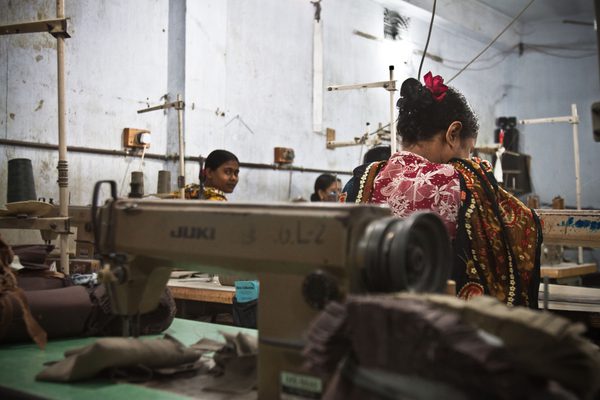Five Years On - The UN Guiding Principles in Kenya, a Three Legged Stool
16 June 2016

On June 16th 2011, the UN Human Rights Council unanimously endorsed the UN Guiding Principles on Business & Human Rights. The Guiding Principles were unprecedented on many levels, including by reaffirming and clarifying state duties to protect against abuses involving business and by authoritatively setting out for the first time the human rights responsibilities of all companies.
Five years on, IHRB reflects on the state of business and human rights, through a series of podcasts and commentaries.
In February 2016, the Government of Kenya announced its intention of developing a National Action Plan (NAP) for the implementation of the UN Guiding Principles on Business and Human Rights (UNGP). This is indeed a positive step, arising out of a commitment that Kenya made at the 2014 UN Universal Periodic Review session and at the recommendation of the Norwegian Government during that review.
The Kenya NAP process is being led by the Department of Justice in the Attorney General’s Office. Picking up on lessons from countries that have already developed NAPs, the plan is to ensure that the process is consultative and inclusive of all stakeholders.
However, at the first briefing meeting with businesses, it was evident that many are not clear or have not heard of the UNGPs. Like many businesses, those present wondered if the UNGPs meant additional regulation, which is often associated with eating into their bottom line. Thus any consultation with this group must seek not just to get their input into a draft NAP document, but also empower them to understand the UNGPs and how they can or are already implementing them into their operations.
In many ways, the three-pillared “Protect, Respect, Remedy” Framework that makes up the UNGPs is like the three-legged traditional African stool whose strength and balance depends on the other two legs.
The protect leg
It is worth noting that Kenya was ahead of the curve when in 2010, a year before the endorsement of the UNGPs, it adopted a Constitution whose Bill of Rights applies to all persons, and whose definition of person includes ‘a company, association or other body of persons whether incorporated or unincorporated’. This means that there is an in-built constitutional requirement for businesses to respect the human rights.
Yet almost six years later, the Kenyan Government has been slow to operationalise this provision and its exact application is still unclear for many businesses. Thus, from a business perspective, a NAP could further confuse matters unless a consultative and inclusive process brings clarity to the responsibilities of business in Kenya on human rights.
Moreover, new laws that are being put in place – for example on mining and upstream oil and gas – do not go far enough in protecting the rights of the individuals and communities that may be adversely affected.
The respect leg
Perhaps where the UNGPs have had their biggest impact in Kenya has been in the agri-business industry, which already had existing certification schemes that had acquainted companies with human rights approaches. For many years, there have been sustained efforts to bring pressure on the tea, flower and other horticulture businesses on the treatment of their workers and in particular on the rights of female workers. This has been bolstered by the alliances that local campaigners have been able to build with the main consumers of the agri-business products in Europe. With the introduction of the UNGPs five years ago, human rights organisations were then able to highlight this authoritative global standard to increase momentum.
The importance of having a global reference point is that assessments of allegations of companies wrong doing can now be based on a harmonised set of parameters, making it easier to hold to account and regulate business conduct. What's more, for companies that are committed to improving their human rights performance, there are readily available tools and resources that are also adaptable across different business sectors.
The remedy leg
With regard to the remedy pillar, the Kenyan Constitution also includes provisions meant to make easier the enforcement of human rights through the court system via measures such as minimising the legal formalities required to commence a legal claim against for alleged harm caused, as well as the elimination of fees to commence such proceedings (regardless of who the case is brought against). While these administrative measures contribute to ensuring access to the courts, more needs to be done to ensure that the court decisions are not hollow victories.
Implementation of court decisions is notoriously difficult in Kenya, particularly when it involves the Government. This is complicated further where the Government is required to implement decisions from regional or international judicial or quasi-judicial mechanisms. This is something that needs to be kept in mind as discussions around an international treaty on business and human rights are had.
On the other hand, there have been commendable moves by some companies (some in extractives and agri-business, as above) to put in place operational level grievance mechanisms. These are yet to realise significant results in resolving grievances at the operational level, and how well they reflect community expectations and practices is yet to be seen. But such a move to consciously ensure that community members, some of whom comprise the companies’ work force, are willing and able to channel their grievances through the company-led grievance mechanisms marks a new turning point in addressing grievances out of court.
The stool is standing, but imbalanced
There is no doubt that the UNGPs have achieved great success in shifting the conversation from whether business have human rights responsibilities to whether businesses are doing enough to prevent, mitigate and redress violations associated with their operations.
The stool is standing, but one leg is longer than the others and its steadiness is in jeopardy. Much remains to be done at the national levels to make it strong and implementation even on all three fronts - particularly in clarifying this as the global standard of expected behavior that businesses should adhere to and spelling out the consequences where that behavior falls short.




